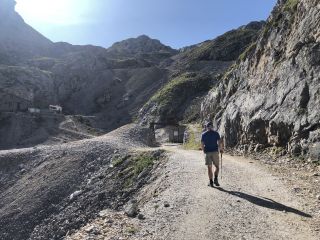Stress
Do You Check Your Emails on Vacation?
Time perception, going with the flow, and traveling in the moment.
Posted August 3, 2023 Reviewed by Devon Frye
Key points
- How we perceive time affects our travel experience.
- Some travellers have a present-time orientation, some have a future-time orientation.
- We can flexibly flip between present and future time-perception orientations.
- A travel flow state enables us to immerse ourselves in travel experiences and learn new skills.
Time flies when you’re having fun—and it sure drags when you’re not.
Peak experience can warp our sense of time, wrote William James (1890), one of psychology’s founding figures. We all know that hours blissfully spent are perceived as relatively short in duration, and yet are recalled fondly and at greater length. On the flip side, stressful or unpleasant travel moments (airport transfers, long queues, standing up on trains) can seem to drag at the time, yet are rarely recalled at any length.
We often use photos and social media to help us retrospectively elongate moments of peak experience from our travel adventures. We scroll retrospectively through our memories, reliving and recalling our favorite travel experiences (walks, parties, excursions) at great length, elongating them in the telling. Meanwhile, the details of those hours spent queuing, waiting for buses, making reservations, and waiting around in hotel lobbies and airport lounges go largely unposted, unphotographed. They don’t make the timeline.
So, here’s the paradox of time, travel, and peak experience: Enjoyable travel experiences zip by in the moment and are elongated in retrospect; unremarkable travel experiences often drag in the moment and are deleted from our recollections.
Do You Travel in the Present or in the Future?
Yet despite this widespread paradox, the relationship between time perception and travel experience is not the same for everyone. There may be individual differences in time perception orientation. During travel (and other activities, for that matter) some of us habitually focus more on the here and now. Others find this hard to do, and habitually have one eye on the future (Zimbardo, 2002).
Do you live in the here and now or do you keep one eye on the future?
The answer to this question is likely to influence how you experience travel, how you behave whilst on vacation, and maybe even how much you enjoy yourself. Travellers with a so-called present-time orientation (living in the present, going with the flow) a more likely to engage in travel involving hedonism, high-risk extreme sports, getting lost in the moment, short-term sexual encounters, drugs, and alcohol use (Keogh et al, 1999). They are more likely to perceive time as accelerating and find it easy to get absorbed in activities. They lose track of time and are also less likely to book or plan detailed travel itineraries in advance (or buy travel insurance). They often say, "I’ll see how I feel in the morning before deciding what the day will bring."
On the other hand, travelers with a future-time orientation (habitual planners with one eye perpetually on the future) tend to have a pre-existing itinerary for each day of a vacation, yet find it harder to lose themselves in pleasurable activities like skiing, dancing, or cooking. They often say, "Let’s make sure we have something planned for each day of the vacation." They also tend to check their emails from the beach.
Which of these travellers are you? It seems that our travel choices and enjoyment levels may be mediated by these individual differences in time perception orientation. A person with a future-time orientation prefers cautious, organised, low-risk itineraries. They find it harder to let go, take risks, or stop thinking about responsibilities back home. They struggle to enjoy the moment; being more concerned with planning ahead and setting goals.

Time Warps Help Us Go with the Flow
Someone with a present-time orientation is more likely to experience a time-warping state of mind known as travel flow. This is typically experienced during immersive activities like windsurfing, which involve a degree of challenge and skill development. Other classic travel-flow activities include climbing and water sports. They are fun and immersive, with the added advantage of helping us learn new skills (Pearce et al, 2011).
And the good news is that travel flow moments can lift the mood.
Immediate satisfaction brought about by absorbing peak experience can be associated with an uplift in mood and well-being, feelings of calm, and tranquility, with time seemingly being suspended. While flow is often associated with active pursuits like swimming and dancing, less strenuous practices (viewing art, learning a language, cooking) are also flow-inducing, especially when accompanied by learning a skill.
Plan for the Future; Travel in the Moment
So what can we learn from the psychology of time perception and travel? Well, maybe the best travel advice is to find a happy medium between present and future orientations.
Rather than defining yourself as either a present-focused or future-focused traveller, the secret of a smart vacation is time-orientation flexibility. You can flip between present and future orientations as circumstance demands.
Adopt a future-time orientation while planning the excursion beforehand, but don’t feel the need to fill up your itinerary before you leave home. Then adopt a present-time orientation while skiing, walking, or visiting galleries.
After all, an overactive future time orientation can dilute the experience of a swim, gallery visit, or walk. An overactive present orientation hampers the capacity to plan a journey and get the logistics right. So you really can focus on the future and the present, at different times. And those emails can wait until you get home.
References
James, W. (1890). The Principles of Psychology, Vol. 1. NYC: Henry Holt and Co
Keogh, K. A., Zimbardo, P. G., and Boyd, J. N. (1999). Who’s smoking, drinking and using drugs? Time perspective as a predictor of substance abuse. Basic and Applied Psychology, 21, 149–164.
Pearce, P. et al (2011) Tourists, Tourism and the Good Life London: Routledge
Stevenson, A. (2023), The Psychology of Travel London: Routledge
Zimbardo, P. G. (2002). Time to take our time. Psychology Today (March/April), 62




